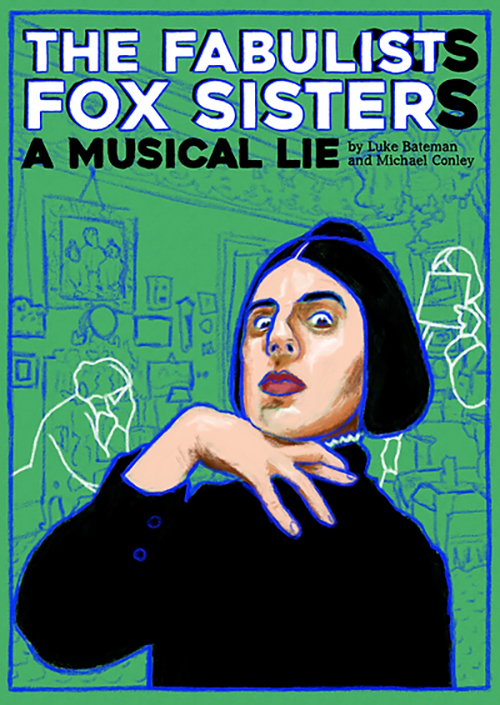The Fabulist Fox Sister: A Musical Lie
The Green Room 42, NYC, September 26, 2023
Reviewed by Chris Struck

Michael Conley’s ode to the founding of spiritualism and the invention of the séance by Kate (Catherine) Fox and her sisters was a comedic, refreshing spectacle, highlighting the gullibility of people through their willingness to believe. The format was simple, weaving history and song together with some truly witty punchlines. It often had the audience near to tears when Conley as Kate Fox both confessed and didn’t confess to the ruse she and her sisters had used to gain fame and fortune. The year was 1892, the month July, and Fox was finally ready to confess, or perhaps not. There were no floating tables or spooky voices, but a rap from a table near Conley introduced us briefly to the other Fox sisters, Maggie and Leah, visiting from beyond. But this was a show about the history of Kate, the most fabulous, “the fabulist,” Fox sister. In Conley’s version of events, she became the most famous; while Maggie grew a conscience and Leah attempted to use the sisters’ fame to marry any wealthy man “whose life she could ruin” (to paraphrase). The actual substance and order of events could be debated, but Conley had the key facts down. many of which could be pulled from Wikipedia; others took a little more digging to research.
What made the show refreshing? It was a musical biopic in cabaret form that put the audience experience first. Conley cleverly left much of the opinion about the result of Kate Fox’s spiritualism open ended, making it seem that while she may have had a definitive impact on spiritualism, it was up to the audience to decide whether she had a larger impact on other issues, such as women’s suffrage. Conley chose to concentrate on Kate, an entertaining character from American and Englis history, who led an interesting life and, in her desperation to relieve boredom and then later to make money, concocted a scheme that grew out of control.
Starting with a focus on Fox’s life, Conley opened with a short number that he that he would later sing in full, reprised with the lyrics “If you believe it/studies have shown you’re not alone.” This type of creative word play was characteristic of the show, whereby Fox would say something definitely true that also insinuated that spirits were real. With “Hydesville,” a song about the town where boredom brought out the worst in little Kate Fox, and “Popping My Toes,” Conley began the journey through the lives of the three sisters from start to dramatic finish. His Kate was never far from being a villain as she manipulated audiences, lied (resulting in the death of an innocent man), and impersonated dead children for years so that she could live comfortably in New York City.
The business of séances could be traced back to the oldest sister, Leah, and this created a dynamic between her and Kate that lasted through much of Kate’s life. The two never saw eye to eye. (Leah published a book defaming Kate, but only after she had reaped the rewards of their scheme.) Their lucrative way to make money attracted many more to the business, best summed up in “If They Believe It”: “Yes, it’s all an act, but the place is packed/if they believe it, I’m not to blame.
” This was followed by the show’s best song, “Bigger Things,” in which Kate sings to her mother, “What you have is not enough/I want more/I’m built for bigger things.” Their career lasted for over 40 years, during which Kate dealt with alcoholism (she started drinking wine as a child). The alcoholism was expressed in two funny, pun-filled songs by Conley—“Jim” and “Glen”—in which Fox sang about her love for Jim Bean (while living in New York) and Glenlivet (while living in England).
Not all of the Fox sisters’ audience members were so gullible, however, and the sisters dealt with a number of individuals who put in some effort to debunk their performances and publicly deny their credibility. (One such person not mentioned in the show was the great magician, Harry Houdini.) The competition from other mediums, the harmful actions of the selfish Leah, and the constant fights against the naysayers eventually led to Kate’s giving a “death blow to spiritualism” in 1888. To a standing-room-only audience, for the first time in years, she revealed it had been an act the entire time. Later, she recanted her confession as a way to make more money. (Spiritualism and the willingness to believe in something greater had quickly outgrown her.) What she said or did no longer mattered to a movement that continues to this day. Despite still being quoted in spiritualist texts, she never regained the early popularity she had enjoyed. (She had rubbed elbows with the elite of America and England for many years.) This fall from grace inspired a thrilling ending song, “I Was Someone”: “I was someone you came to see/people have to believe in something, why not me?”
The songs were written by Conley (lyrics) and Luke Bateman (music). The Fabulist Fox Sister was first performed in 2020 at England’s Southwark Playhouse, and it has had multiple reiterations for different formats, including being reimagined for cabaret. Conley’s performance as Fox was tremendous. His thrown voice and acting were near flawless, and along with his comedic delivery, they combined to create an atmosphere that transcended the times.





